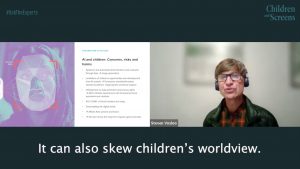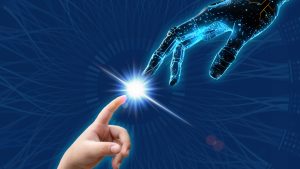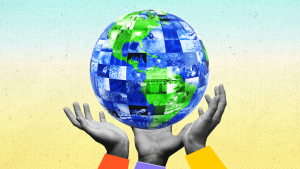
Steven Vosloo, MCom (Digital Foresight and Policy Specialist, UNICEF), details how bias implicit in AI tools may impact children’s worldviews in #AskTheExperts webinar “AI and Children: Risks and Opportunities of the Enhanced Internet” on December 6, 2023.
Read the Video Transcript
[Steven Vosloo]: The three examples we can give as around persuasive misinformation and disinformation. I’ve used the word persuasive because increasingly it’s impossible to tell whether something text was generated by a human, or an AI, or images. It can also skew children’s worldview. Again, this is about the data that’s been used in the models. But because much of the data comes from the global north, from the US, from Europe, or from the cohort of people who created internet content, a lot of that doesn’t represent the world view of the people of the global south and obviously this is an issue for UNICEF that’s a global organization. And so children don’t see themselves represented in the stories, or in the examples that they are given help with their homework. We’ve also seen research that says when children use large language models to help them write an essay, the bias in the model, and this is unintentional bias throughout the model trying to shape the child’s worldview, but it does shape the positions that they take in writing that essay, kind of whether they’re for something or against it. And so over time this could merge – change how you see the world. I often think that previously we’ve thought about or that there is a concern that algorithms have moved the minority on the edges to extreme positions. But perhaps the new danger is that the majority in the middle or the majority of users get moved to the middle. And with the kind of a more generic homogenous worldview that doesn’t represent everyone.
View the full webinar

AI and Children: Risks and Opportunities of the Enhanced Internet
Generative AI technologies like ChatGPT are changing the nature of online communications, work, creativity, and learning. What are the impacts to children’s social and cognitive development in this new, turbocharged Internet?
Naomi Baron, PhD
Professor Emerita of Linguistics, American University
Steven Vosloo, MCom
Digital Foresight and Policy Specialist, UNICEF
Ying Xu, PhD
Assistant Professor of Learning Sciences and Technology, University of Michigan
Christine Bywater, MA
Assistant Director, Center To Support Excellence in Teaching (CSET), Project Lead, CRAFT, Stanford Graduate School of Education
Tracy Pizzo Frey, MBA
Senior Advisor, Common Sense Media



